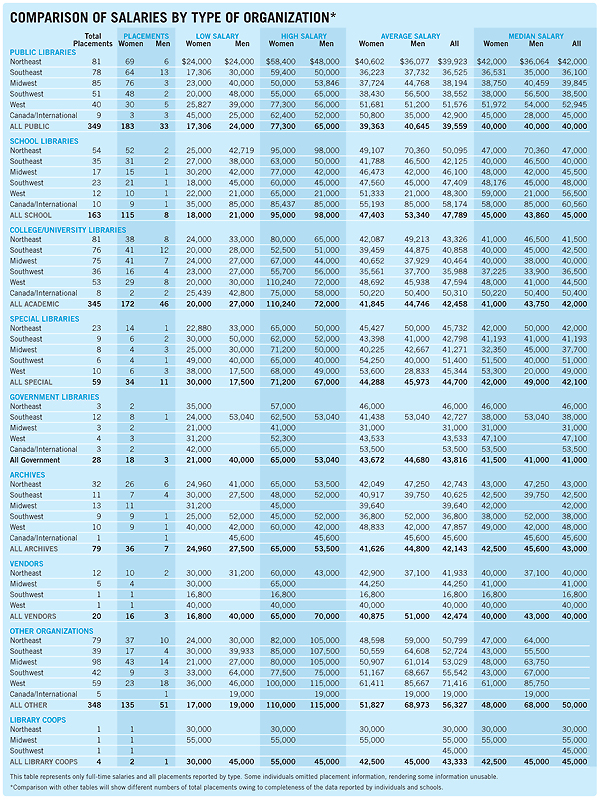Placements & Salaries 2014: Public, Academic, and Special Libraries
Also in this article:
Public positions grow
Public libraries continue to see positive growth and opportunity. In 2013, nearly 24% of the reported placements were in public libraries, up from 18.7% in 2012. Of equal note, the average starting salaries for public libraries increased approximately 4%, improving to $39,559 in 2013 (up $1,570 from 2012). This follows the pattern set between 2011 and 2012, when salaries for similar placements increased 1.7%. By far the most popular choice of jobs in public libraries falls within children’s and youth services, making up 37.4% of the overall placements, with an average starting salary of $42,069. It was not unusual for many of the new public librarians to wear multiple hats, working across units rather than being tied to a single department. Technology, customer service, social media creation and management, and community outreach were all identified as likely tasks throughout the workday.
Beyond academic buildings
In 2013, approximately 9.8% of grads who sought employment in academic institutions accepted positions in departments outside of the library. These included working with information technology, learning management systems, and assessment. In addition to other academic units, 23.6% of this year’s new professionals were hired as academic librarians in a variety of capacities; this is up from 21.2% in 2012. Regardless of whether in the academic library or in another unit, grads placed a strong emphasis on working with and developing emerging technologies and e-resources. Digital project management and scholarly communication projects cropped up repeatedly in the discussions of job roles and areas of responsibility.
While the reported numbers remain small, new archivists found improved rates of placement, with 5.4% of the jobs reported overall—up from 4.9% in 2012 and 2.9% in 2011. Approximately 40.5% of the newly filled archival positions were in the Northeast, down from 2012, when 44.7% was reported. However, the Southeast realized the best growth in percentage of placements, rising to 13.9% from 12.7% the previous year. Along with the growth in reported placements came a bump in salary, climbing an average of $3,268 (approximately 8.4%) to $42,143 (up from $38,875 in 2012). The new archivists shared a growing focus on digital collections, database management, and metadata processes. A new role identified by a handful of the new grads was digital forensics.
Special libraries steady
Placements at special libraries (4.0%), government libraries (1.9%), and LIS vendors (1.4%) held steady in 2013. However, reports of placements in special libraries have fallen off in recent years, dropping from 6% in 2011 to 3.6% in 2012. This may signal, as some suggest, that hospital and corporate libraries, among others, are becoming obsolete, or it may indicate changing roles and titles within these situations. A very small number of new graduates were placed in other types of governmental agencies at the state and federal levels, including military, health, and law enforcement. Grads enumerated metadata, training, information technology, and project management as standard tasks in these types of positions.
RELATED
ALREADY A SUBSCRIBER? LOG IN
We are currently offering this content for free. Sign up now to activate your personal profile, where you can save articles for future viewing











Add Comment :-
Comment Policy:
Comment should not be empty !!!